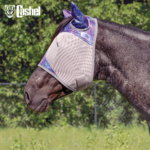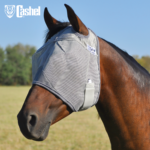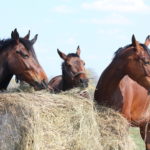Wind is the universal calling card of winter. With or without snow, sleet and/or rain, gusty weather can be a deceptively harsh force visited upon your horses. Three potential health hazards come blowing in the wind.

Loss of body heat. Wind chills horses by blowing surface heat away from their bodies as quickly as it can be generated. Winds strong enough to ruffle winter coats leave horses even colder by sapping heat reserves normally trapped under thick hair layers. Combine such a wind with moisture in one form or another, and the chilling effects are even more drastic. When they can, horses stand with their rumps to the wind, using their tails to block the gusts. This natural protection is effective enough for unclipped horses, but a windbreak, such as a run-in shed or a stand of evergreen trees, gives them the best protection. Closely clipped horses require blanketing in cool, windy weather, starting at about 50 degrees Fahrenheit.
Eye irritation. Gusty wind stirs up dirt and dust that can irritate a horse’s eyes. Conjunctivitis, the inflammation of the tissues surrounding the eyeball, commonly results when a horse rubs his eyes in response to windblown irritants. Again, a windbreak reduces this hazard, but a fly mask is even better, providing mobile protection during gusty weather.
Flying or falling objects, Strong winds increase a field-kept horse’s risk of bodily harm. Aged or weakly rooted trees can lose large limbs or be blown over by fierce gusts, and pastured horses near them may not have enough warning to clear the area before they fall. Lightweight or “balloony” equipment and materials, such as empty water troughs, buckets, loose roofing material and tarps, may be picked up by the wind to spook your horses and possibly cause injury, either through direct hits or by scaring them into harm’s way. Shoddily constructed or poorly maintained buildings can come tumbling down in high winds, especially if snow or ice builds up on the roof. When high winds are forecast for your area, stable or pasture your horses in your safest areas, and batten down potential flying objects. In general, keep your buildings weather worthy and your trees pruned of deadwood.





